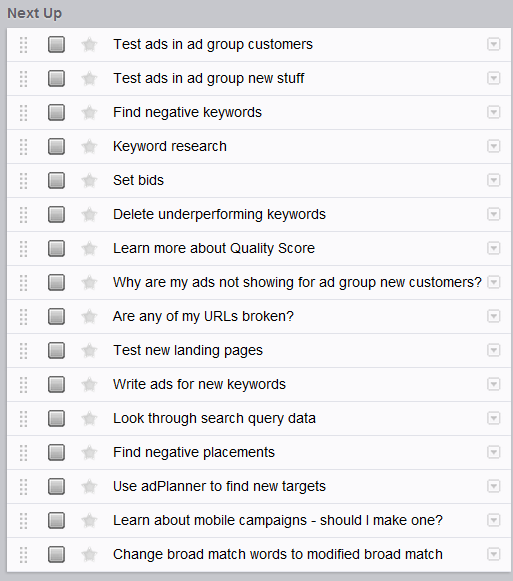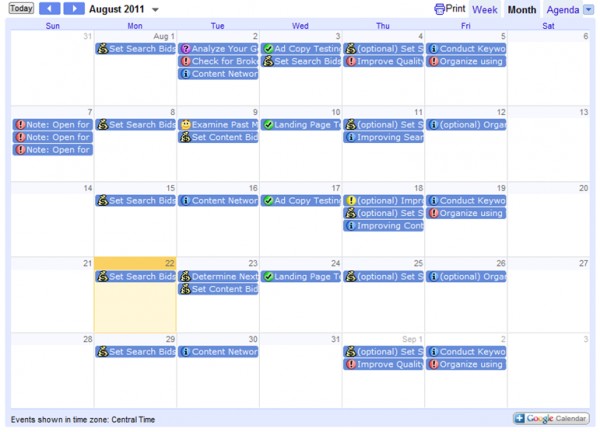How To Run Your PPC Accounts Like A Project
Managing PPC accounts can be overwhelming. There is so much to-do, and no one ever has enough time. This leads most people to just make huge todo lists of items they either should be doing, or want to eventually do inside their account. The problem with to-do lists is that they are easy to ignore. […]
Managing PPC accounts can be overwhelming. There is so much to-do, and no one ever has enough time.
This leads most people to just make huge todo lists of items they either should be doing, or want to eventually do inside their account.

The problem with to-do lists is that they are easy to ignore. There are still items on my to-do list from last decade. Of course, I don’t delete them as someday, I might get to them. We all know that’s not true – but we keep telling ourselves it could happen.
When your PPC accounts are run like to-do lists what happens is that every few weeks, you scamper around like crazy for two straight days trying to figure out what went wrong, what you should be doing, how to fix it all, then you do not touch the account again for another few weeks.
The other problem of to-do lists is that there is rarely that feeling of accomplishment that your day is done as there is always something else to take its place. It’s a depressing, never-ending list of items where you have to spend your precious time.
Most accounts (and by no means all of them) can be managed in just a simple hour a day of attention (if you know what to do) and you actually do it.
The problem is getting organized. Many people either spend too much time getting organized and not actually doing anything or they chase their tail all day instead of taking a step back to get organized.
If you are running your AdWords account like a to-do list, we’ll look at two simple ways to change your style. One is useful if you are the only one running the account and another is useful for companies who have multiple analysts or agencies that have multiple clients.
Determine What You Must Do Every Month
The first step to getting organized is to determine what must be done every single month. Write down what you would like to do each month (this is not an exhaustive list):
- Change search bids on Tuesday and Thursday
- Change placement bids on Monday and Wednesday
- Add new keywords the first week of every month
- Examine search queries for negative keywords every other week
- Test new ads every other week
- Test a new landing page every other week
- Create monthly reports the first week of each month
- Do quarterly reviews of geographic data
- Do quarterly reviews of time based data
The list goes on. Based upon your account and team size, you may do these items, and others, less or more frequently
Choose An Organizational System
The next step is to choose where you will be organized. If you are managing a team, are part of an agency, want a centralized place to keep and store data, or others may want insight into what is being done, what has not been done, and what’s next – then use a project management system.
If you are running the account by yourself and no one needs any insight, then use a calendar.
Turning Your PPC Account Into An Ongoing Project
If you are a project manager, you probably hate this headline. There is no such thing as an ongoing project. Projects have start dates, end dates, milestones and tasks in-between.
However, for those who do not live in the world of project management, this is the easiest way to think about managing PPC accounts – a month-to-month project.
Next, you will want to choose a project management system to input your data so you can easily track it. I find there are two types of project management systems:
- Those that have reoccurring tasks and are used as both project management and business management
- Those that do not have reoccurring tasks and try to be pure project management software
If you choose software that does support reoccurring tasks (such as Deskaway or Podio) then input your tasks and mark them as reoccurring so the tasks show up on the appropriate dates.
If you choose a software that does not support reoccurring tasks (such as Basecamp) then your only choice is to make sure it supports templates. This is not as good as software that does support reoccurring tasks, as most project management software does not allow you to have a project go live on the first of each month automatically.
Therefore, you often create a template, manually set it up, and might have to manually fix some due dates. It is still better than living in to-do lists, but not as eloquent as software that supports reoccurring tasks.
If you have multiple clients, set each one up as a different project. If you have multiple team members, then assign the tasks as necessary to the various team members. If new items come up, you can add them as a new task list for that month if they are one time issues or as a new reoccurring item if they need to be done over and over again.
Once you are set up on a project management system, you then can see what needs to be done each day, do it – and when you do it, you will have a sense of accomplishment as you can actually be done for a day. That is a satisfaction that to-do lists cannot give you as there are always more items to take the place of what has been accomplished.
Now, your boss can see what you’re doing and have done. If you are a very transparent agency, you can even let your clients login and see all the work you are doing for them so they no longer question your work.
Using A Simple Calendar To Track Your PPC To-Dos
If you are managing a single account, you are the business owner, or PPC is not your life – it’s that other task you were stuck with, then project management software is often overkill. Just use a calendar instead.
The upside to a calendar is most people already use a calendar on a regular basis so there is no need to have yet another place where you are logging into on a regular basis.
In addition, calendars are built to have recurring tasks, so there’s no need to evaluate project management systems to find what options it supports. The downside of a calendar is that it is difficult to keep notes of previous activity or give others insight into your work.
If you wish to use a calendar, take your lists of items and place them into your calendar. When you put the items into your calendar, estimate how much time a task should take and block off your calendar for the allotted amount of time so that you can accomplish your tasks.
Wrap-up
If you aren’t careful, your PPC accounts can either consume your entire day, or they never get better because you never spend the proper amount of time to nurture and grow them.
By finding an organization structure that works for you and your company, you can manage and grow your PPC accounts in a reasonable amount of time so that they can be profitable, you can feel productive, and everything you want to do actually gets accomplished.
Contributing authors are invited to create content for Search Engine Land and are chosen for their expertise and contribution to the search community. Our contributors work under the oversight of the editorial staff and contributions are checked for quality and relevance to our readers. The opinions they express are their own.
Related stories
New on Search Engine Land
